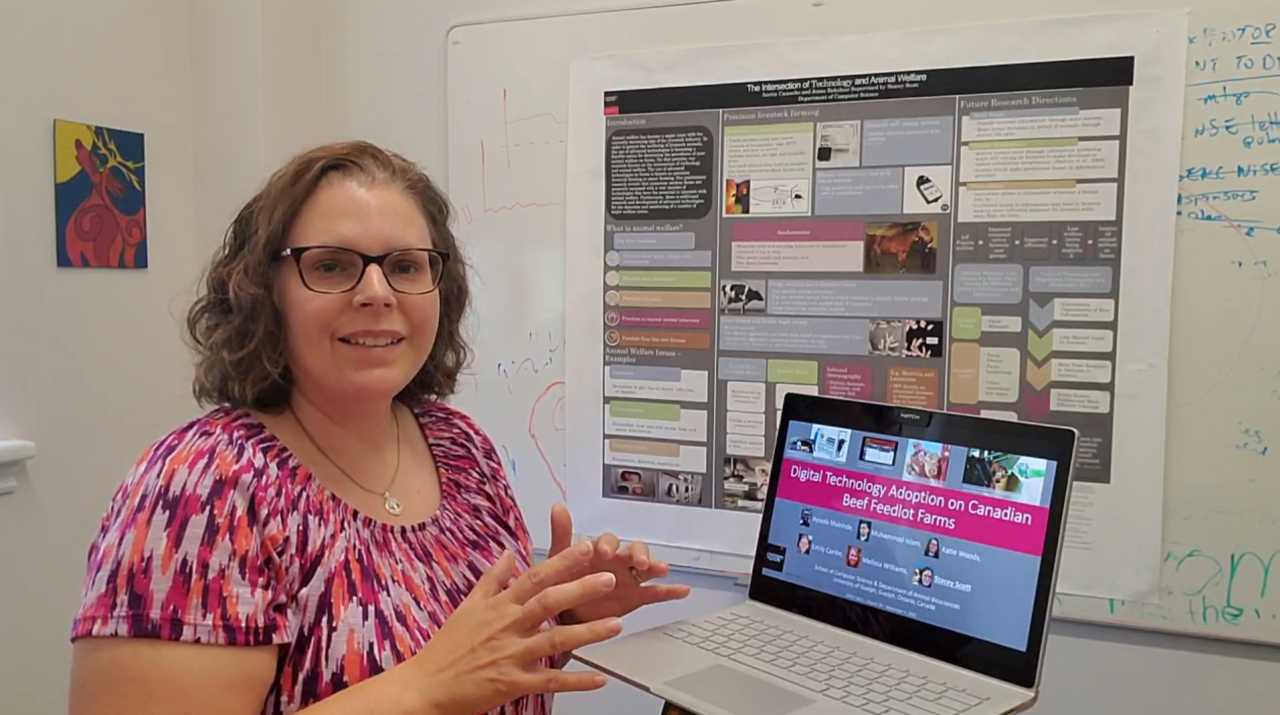
Animals are Users Too: Improving Precision Livestock Farming Technologies with AI
Dr. Stacey Scott, professor in the School of Computer Science at University of Guelph and CARE-AI affiliated faculty, has a love/hate relationship with computers. Scott believes that emerging technologies can vastly improve the lives of their users. However, she’s sure to profess how she really feels about them.
“I think they suck sometimes”, she says. “And so that motivates me to make them better”.
During graduate school, Scott took a course on human-computer interaction (HCI) that shaped the trajectory of her career. She became fascinated with how insights from fields such as sociology and psychology could help build computers that are user-centric. In short, computers that do not suck.
Humans, however, are not the only users of computers.
When Scott was on her way to work one day, she noticed a downed horse in a field. It took Scott some time to get someone on the phone who could attend to the horse, and as she walked to her lecture she wondered how long the animal had been in distress. It was this incident that motivated Scott to expand her research to emerging technologies for precision livestock farming (PLF).
PLF uses machine learning tools to assist with day-to-day animal care. Scott’s current focus is in the beef and dairy industries. Wearable sensors, automated milking systems (AMSs), calving detection systems, and drones that assist with animal health and welfare monitoring promise to greatly improve livestock farming. As Scott has shown, these tools must be user friendly and affordable from the farmer’s perspective to be adopted.
Scott and others have also shown that PLF technologies can be overly complex and underutilized. For instance, AMSs, which collect vast amounts of data about a cow’s health during the automated milking process, use recurrent neural networks (RNNs) and other AI models to analyze these data to detect diseases, such as mastitis. However, such AI-assisted data interpretations, which are designed to support farmer decision-making and animal well-being, often provide overwhelming or unintuitive amounts of information that are ignored by farmers.
Scott is also interested in the too often neglected other user of these systems – the animal. Building on the insights of HCI, the field animal-computer interaction (ACI) aims to aid animals in their daily activities and improve animal welfare, as well as human-animal relationships. Scott hopes to bring the insights of ACI to bear on the development of PLF technologies. To ensure that farmers reap the benefits of these technologies, usability from the cow’s perspective needs to be seriously considered. Often, there can be a stressful onboarding process for the cow while they adapt to the AMS, and some never do.
Although ACI has borrowed much from HCI, new methods must be developed for this emerging field. As Scott remarks, “You can’t give a cow a survey”. An interactive, iterative design process that places the animal at the center of development will be crucial to the future of PLF.
Outside of work, Scott enjoys hiking, camping and K-pop. As an avid fan, the lack of subtitles for most K-pop media can be frustrating. In the Fall, Scott will be launching a new research project to work on natural language processing models for translation, a project sure to be appreciated by the hundreds of millions of K-pop fans. She will continue, though, to focus on the welfare of the even more numerous cows the world over.
Enterprise Business Analyst | Digital & Business Transformation ERP/CRM | Agile Business Analysis | Product Manager | Product Owner | Innovation and Design Thinking | B2B & B2C Customer Experience
1yCongrats Professor Scott!
Software Developer at Bell
1yCongrats Professor Scott!